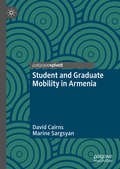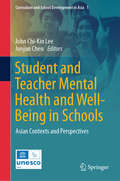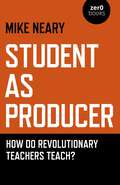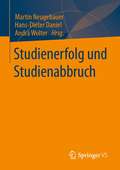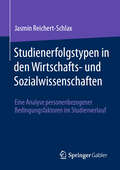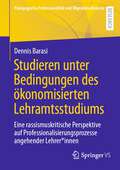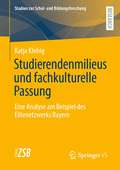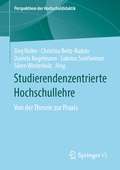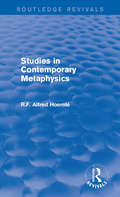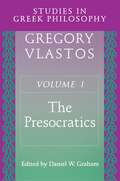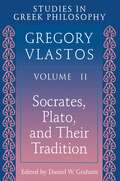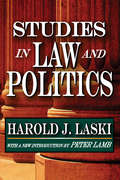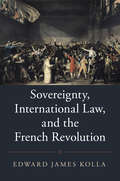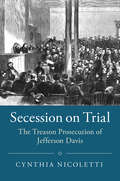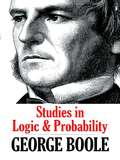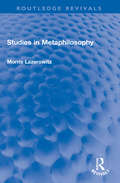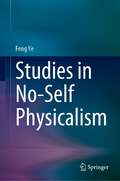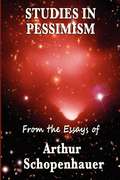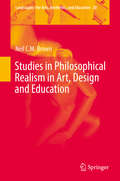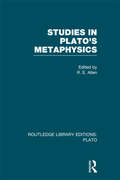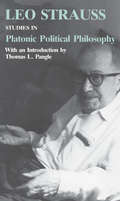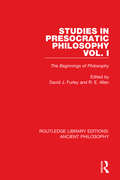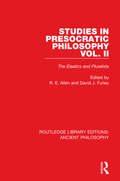- Table View
- List View
Student and Graduate Mobility in Armenia
by David Cairns Marine SargsyanBased on exploratory research with students and graduates conducted in Armenia and its diaspora during summer 2018, Cairns and Sargsyan provide insight into some of the challenges involved in moving abroad, focusing on three different destinations: Russia, the United States and the European Union. Additionally, Student and Graduate Mobility in Armenia considers issues that have an impact on life chances for highly qualified young people who wish to remain in Armenia, including perceptions of corruption in the local labour market and hopes for the future following the Velvet Revolution of spring 2018. This research will be of interest to students and scholars of mobility, youth, employment and education.
Student and Teacher Mental Health and Well-Being in Schools: Asian Contexts and Perspectives (Curriculum and School Development in Asia #1)
by John Chi-Kin Lee Junjun ChenThis book draws upon empirical, conceptual and theoretical evidence from a variety of studies on student and teacher well-being in Asian contexts. It examines the mental health and well-being of students and teachers, how these are shaped by possible drivers, and what the consequences are across different developmental stages at different educational sectors. It advances our understanding of how uniquely Asian culture and educational systems affect student and teacher mental health and well-being, in the context of globalized influences and the impact of western theories. This edited volume assists researchers, educators, and practitioners in including aspects of well-being into research and practice.
Student as Producer: How do Revolutionary Teachers Teach?
by Mike NearyStudent as Producer is set between the student protests and urban riots that erupted in England in 2010-2011 and the 2017 General Election, during which students and young people played a significant role by protesting the politics of austerity and by supporting the politics of Corbynism. This revolutionary curriculum is framed around unlearning the law of labor and the institutions through which the law of labor is enforced, including the capitalist university which seeks growth and expansion for the sake of growth, neglecting the needs of students in favor of the needs of the capitalist state.Through thought experiments and reference to the work of the Soviet legal theorist, Evgeny Pashukanis, Student as Producer searches for solutions to how cooperatives might be brought about by a sense of common purpose and social defense. Mike Neary grounds his answers in a version of Marx's social theory known as 'a new reading of Marx', as advanced by authors such as Werner Bonefeld and Moishe Postone. The theory is applied to various aspects of pedagogy, criminology, and political sociology to create a curricula for revolutionary teaching that will aid activists who are seeking ways in which to engage critically with higher education.
Studienerfolg und Studienabbruch
by Hans-Dieter Daniel Martin Neugebauer Andrä WolterDie Sicherung des Studienerfolgs gehört zu den großen Herausforderungen für Hochschulen: Nach derzeitigen Schätzungen verlassen knapp 30 % aller Bachelorstudierenden die Hochschulen ohne Abschluss. Schon weil es sich um eine quantitativ so bedeutsame Gruppe handelt, sind Fragen nach den Ursachen und Folgen von Studienabbrüchen von hoher Relevanz – für Hochschulen und Bildungsforschung gleichermaßen. Trotz hoher Bedeutsamkeit wurde das Thema Studienabbruch durch die empirische Hochschulforschung bislang vergleichsweise wenig fokussiert. Seit 2017 fördert das Bundesministerium für Bildung und Forschung daher in der Förderlinie „Studienerfolg und Studienabbruch“ 19 (Verbund-)Projekte, um mehr empirisch gesichertes Wissen zum Phänomen Studienabbruch zu generieren. Zum Ablauf der ersten Förderphase werden in diesem Sammelband die zentralen Erkenntnisse der Forschungsprojekte dargestellt.
Studienerfolgstypen in den Wirtschafts- und Sozialwissenschaften: Eine Analyse personenbezogener Bedingungsfaktoren im Studienverlauf
by Jasmin Reichert-SchlaxDurch aktuelle Herausforderungen wie hohe Studierendenzahlen wird es insbesondere in den großen Studiendomänen der Wirtschafts- und Sozialwissenschaften zunehmend schwerer, die Lernbedarfe einzelner Studierender frühzeitig zu identifizieren und diese in der Lehre zu berücksichtigen. Die gleichzeitig starke Heterogenität der Studierendenschaft macht es erforderlich, Wege zu suchen, vulnerablen Gruppen über das generelle Lehrangebot hinaus spezifische Angebote zu machen, um die Studierenden adäquat zu unterstützen und somit ein erfolgreiches Studium zu ermöglichen. Das Erreichen individuellen Studienerfolgs ist schließlich ein zentrales Ziel der Hochschulbildung. Eine einheitliche Definition von Studienerfolg liegt jedoch bis heute nicht vor. Die vorliegende Untersuchung fokussiert zum einen die Bildung von Studienerfolgstypologien im Bachelorstudium unter Einbezug zahlreicher Facetten von Studienerfolg, und zum anderen die Prüfung der bisherigen Forschungsbefunde hinsichtlich personenbezogener Merkmale zur Prädiktion von Studienerfolg und damit zur Identifikation vulnerabler Studierendengruppen. Die Analyse zeichnet sich insbesondere durch das ganzheitliche theoretisch-konzeptuelle Studienerfolgsverständnis aus, das empirisch mittels clusteranalytischer Verfahren einer gemeinsamen Betrachtung zugänglich gemacht wird
Studieren unter Bedingungen des ökonomisierten Lehramtsstudiums: Eine rassismuskritische Perspektive auf Professionalisierungsprozesse angehender Lehrer*innen (Pädagogische Professionalität und Migrationsdiskurse)
by Dennis BarasiDie Studie geht der Frage nach, inwiefern eine rassismuskritische Professionalisierung von Lehramtsstudierenden unter den Bedingungen der sich im Lehramtsstudium verdichtenden ökonomisierten Studienstrukturen stattfinden kann. Hierzu werden Vermittlungsprozesse von Reflexionswissen und Kompetenzen unter den Bedingungen des Lehramtsstudiums aus rassismuskritischer Perspektive untersucht. Das Datenkorpus der Studie basiert auf umfangreichen, teilweise über zwei Semester reichenden Teilnehmenden Beobachtungen in erziehungswissenschaftlichen und physikdidaktischen universitären Lehrveranstaltungen. Demnach greift die Studie auf einen ethnographisch informierten Forschungsansatz zurück, bei dem aufgrund der spezifischen Feldbedingungen des Forschungsfeldes ‚universitäre Lehrveranstaltung‘ bereits während der Beobachtungen umfassende Notizen angefertigt werden konnten. Ausführliche Beobachtungsprotokolle wurden dann – basierend auf diesen Feldnotizen – unmittelbar nach den beobachteten Lehrveranstaltungen angefertigt. Forschungs-Gespräche mit beteiligten Studierenden ergänzen die empirische Grundlage der Studie. Die Studie folgt in Design und Auswertungsmethode dem Forschungsparadigma der Reflexiven Grounded Theory.
Studierendenmilieus und fachkulturelle Passung: Eine Analyse am Beispiel des Elitenetzwerks Bayern (Studien zur Schul- und Bildungsforschung #87)
by Katja KlebigMit der Öffnung der Hochschulen beginnen mehr Studierende aus unterschiedlichen Herkunftsmilieus ein Studium. Ob sie dabei erfolgreich sind, hängt nicht zuletzt von den angewählten Studienfächern ab. Denn es zeigt sich, dass die Fachwissenschaften ganz eigene habituelle Ansprüche an die Studierenden stellen, denen nicht jedes Studierendenmilieu adäquat begegnen kann. In dem Buch werden bildungsbezogene Habituszüge von Studierenden in vier unterschiedlichen Studiengängen qualitativ untersucht und zu den Anforderungen und Erwartungen der Studiengänge in Beziehung gesetzt.Die Autorin Katja Klebig ist wissenschaftliche Mitarbeiterin am Lehrstuhl für Sozialstrukturanalyse der Martin-Luther-Universität Halle-Wittenberg. Die Dissertation war in der DFG-Forschungsgruppe „Mechanismen der Elitebildung im deutschen Bildungssystem“ (FOR 1612) assoziiert. Neben bildungssoziologischen Themen beschäftigt sie sich mit sozialer Ungleichheit, Milieuforschung, Habitusanalyse und qualitativ-rekonstruktiver Sozialforschung.
Studierendenzentrierte Hochschullehre: Von der Theorie zur Praxis (Perspektiven der Hochschuldidaktik)
by Jörg Noller Christina Beitz-Radzio Daniela Kugelmann Sabrina Sontheimer Sören WesterholzDer Sammelband geht den Fragen nach, was eigentlich studierendenzentrierte Lehre ist, welche konkreten Herausforderungen bei der Umsetzung einer studierendenzentrierten Lehre auftreten und wie eine solche Lehre angesichts dieser Herausforderungen umgesetzt werden kann. Aber auch: Welche Hürden haben sich bisher als unüberwindbar erwiesen, und wie können Lehrende damit umgehen?
Studies in Contemporary Metaphysics (Routledge Revivals)
by R.F. Alfred HoernléOriginally published in 1920, this title wrestles with the critical conflict in modern philosophy of whether philosophers should employ pure reason in a world of abstracts or, rather, should rely upon experience and rationality to examine the actual world. Hoernlé argues for the latter and emphasises the importance of metaphysics in the intellectual quest for knowing reality. This title is ideal for students of philosophy and provides insightful background into the diverging philosophical views of the early 20th century.
Studies in Greek Philosophy, Volume I: The Presocratics
by Gregory VlastosGregory Vlastos (1907-1991) was one of the twentieth century's most influential scholars of ancient philosophy. Over a span of more than fifty years, he published essays and book reviews that established his place as a leading authority on early Greek philosophy. The two volumes that comprise Studies in Greek Philosophy include nearly forty contributions by this acknowledged master of the philosophical essay. Many of these pieces are now considered to be classics in the field. Perhaps more than any other modern scholar, Gregory Vlastos was responsible for raising standards of research, analysis, and exposition in classical philosophy to new levels of excellence. His essays have served as paradigms of scholarship for several generations. Available for the first time in a comprehensive collection, these contributions reveal the author's ability to combine the skills of a philosopher, philologist, and historian of ideas in addressing some of the most difficult problems of ancient philosophy. Volume I collects Vlastos's essays on Presocratic philosophy. Wide-ranging concept studies link Greek science, religion, and politics with philosophy. Individual studies illuminate the thought of major philosophers such as Heraclitus, Parmenides, Anaxagoras, and Democritus. A magisterial series of studies on Zeno of Elea reveals the author's power in source criticism and logical analysis. Volume II contains essays on the thought of Socrates, Plato, and later thinkers and essays dealing with ethical, social, and political issues as well as metaphysics, science, and the foundations of mathematics.
Studies in Greek Philosophy, Volume II: Socrates, Plato, and Their Tradition
by Gregory VlastosGregory Vlastos (1907-1991) was one of the twentieth century's most influential scholars of ancient philosophy. Over a span of more than fifty years, he published essays and book reviews that established his place as a leading authority on early Greek philosophy. The two volumes that comprise Studies in Greek Philosophy include nearly forty contributions by this acknowledged master of the philosophical essay. Many of these pieces are now considered to be classics in the field. Perhaps more than any other modern scholar, Gregory Vlastos was responsible for raising standards of research, analysis, and exposition in classical philosophy to new levels of excellence. His essays have served as paradigms of scholarship for several generations. Available for the first time in a comprehensive collection, these contributions reveal the author's ability to combine the skills of a philosopher, philologist, and historian of ideas in addressing some of the most difficult problems of ancient philosophy. Volume I collects Vlastos's essays on Presocratic philosophy. Wide-ranging concept studies link Greek science, religion, and politics with philosophy. Individual studies illuminate the thought of major philosophers such as Heraclitus, Parmenides, Anaxagoras, and Democritus. A magisterial series of studies on Zeno of Elea reveals the author's power in source criticism and logical analysis. Volume II contains essays on the thought of Socrates, Plato, and later thinkers and essays dealing with ethical, social, and political issues as well as metaphysics, science, and the foundations of mathematics.
Studies in Law and Politics (Essay Index Reprint Ser.)
by Harold LaskiThe essays that comprise Studies in Law and Politics are by and large academic. But Laski had a purpose in addition to the purely scholarly: he was eagerly pursuing possibilities for social and political change. Laski sought tirelessly for opportunities to act on those possibilities and, as is the case throughout his work, his academic and political purposes have no clear boundary between them.Studies in Law of Politics was published at a crucial juncture in Laski's ideological metamorphosis. During this period he had become increasingly worried that socialists might not be able to achieve the growth of working-class power. Although the essays contained in the volume cover a wide range of topics, and a wide span of time since the mid-1920s, he brought them into unity by a common approach. Though he does not make his unifying premise immediately evident to his readers, he clearly meant to chart the growth of power of those who had previously been without influence. His goal also was to identify the problems facing growth in a highly modernized society.Studies in Law and Politics reveals Laski's growing realization that the road to socialism might be more difficult than what he had believed when he wrote his pluralist works. The book reflects the mind of a thinker who was not content to write exclusively as an academic or a political activist. His view was that, while progressive reforms have been achieved in the past, they are not easily accomplished, and obstacles to further reforms should not be underestimated. This sober work offers much insight into Laski's intellectual development, as well as the times about which he wrote.
Studies in Legal History: Sovereignty, International Law, and the French Revolution (Studies in Legal History)
by Edward James KollaThe advent of the principle of popular sovereignty during the French Revolution inspired an unintended but momentous change in international law. Edward James Kolla explains that between 1789 and 1799, the idea that peoples ought to determine their fates in international affairs, just as they were taking power domestically in France, inspired a series of new and interconnected claims to territory. Drawing on case studies from Avignon, Belgium, the Rhineland, the Netherlands, Switzerland, and Italy, Kolla traces how French revolutionary diplomats and leaders gradually applied principles derived from new domestic political philosophy and law to the international stage. Instead of obtaining land via dynastic inheritance or conquest in war, the will of the people would now determine the title and status of territory. However, the principle of popular sovereignty also opened up new justifications for aggressive conquest, and this history foreshadowed some of the most controversial questions in international relations today.
Studies in Legal History: The Treason Prosecution of Jefferson Davis (Studies in Legal History)
by Cynthia NicolettiThis book focuses on the post-Civil War treason prosecution of Confederate President Jefferson Davis, which was seen as a test case on the major question that animated the Civil War: the constitutionality of secession. The case never went to trial because it threatened to undercut the meaning and significance of Union victory. Cynthia Nicoletti describes the interactions of the lawyers who worked on both sides of the Davis case - who saw its potential to disrupt the verdict of the battlefield against secession. In the aftermath of the Civil War, Americans engaged in a wide-ranging debate over the legitimacy and effectiveness of war as a method of legal adjudication. Instead of risking the 'wrong' outcome in the highly volatile Davis case, the Supreme Court took the opportunity to pronounce secession unconstitutional in Texas v. White (1869).
Studies in Logic and Probability (Dover Books on Mathematics)
by George BooleFrom one of the founders of symbolic logic comes this collection of writings on logical subjects and related questions of probability. George Boole invented Boolean logic, the basis of modern digital computer logic, for which he is regarded as a founder of the field of computer science. This authoritative compilation of his papers features his most mature thinking on Boolean logic and includes previously unpublished material.Appropriate for upper-level undergraduates and graduate students, the contents range from The Mathematical Analysis of Logic to Boole's final works, including The Laws of Thought, the most systematic statement of his ideas on logic and probability. Boole had intended to create a follow-up volume but did not survive to fulfill his ambition; this volume features his further studies on the subject.
Studies in Metaphilosophy (Routledge Revivals)
by Morris LazerowitzFirst Published in 1964, Studies in Metaphilosophy presents and develop the hypothesis about the nature of metaphysical theories. Each study is a fresh attempt to improve our understanding of what a philosophical theory is and what its supporting arguments come to. Author argues that philosophical theories are nothing more substantial than linguistic chimeras and has the important function of pointing up the need for the examination of the whole subject. The volume discusses important themes like concept analysis, systematic doubt, the method of deduction from fact, logical necessitation, the nature of philosophical analysis, the nature of value, the metaphysical concept of space, Moore and philosophical analysis, the hidden structure of philosophical theories, and the relevance of psychoanalysis to philosophy. This volume will be an essential source for scholars and researchers of philosophy, logic, and metaphysics.
Studies in No-Self Physicalism
by Feng YeThis book demonstrates how a radical version of physicalism (‘No-Self Physicalism’) can offer an internally coherent and comprehensive philosophical worldview. It first argues that a coherent physicalist should explicitly treat a cognitive subject merely as a physical thing and should not vaguely assume an amorphous or even soul-like subject or self. This approach forces the physicalist to re-examine traditional core philosophical notions such as truth, analyticity, modality, apriority because our traditional understandings of them appear to be predicated on a cognitive subject that is not literally just a physical thing.In turn, working on the assumption that a cognitive subject is itself completely physical, namely a neural network-based robot programmed by evolution (hence the term ‘No-Self’), the book proposes physicalistic theories on conceptual representation, truth, analyticity, modality, the nature of mathematics, epistemic justification, knowledge, apriority and intuition, as well as a physicalistic ontology. These are meant to show that this No-Self Physicalism, perhaps the most minimalistic and radical version of physicalism proposed to date, can accommodate many aspects that have traditionally interested philosophers. Given its refreshingly radical approach and painstakingly developed content, the book is of interest to anyone who is seeking a coherent philosophical worldview in this age of science.
Studies in Pessimism
by Arthur SchopenhauerCollected here are nine short essays, On the Sufferings of the World, The Vanity of Existence, On Suicide, Immortality: A Dialogue, Psychological Observations, On Education, Of Women, On Noise, and A Few Parables, by the world renowned philosopher Arthur Schopenhauer.
Studies in Philosophical Realism in Art, Design and Education
by Neil C. M. BrownThis book fills a gap in the literature of 21st century international visual arts education by providing a structured approach to understanding the benefits of Philosophical Realism in art education, an approach that has received little international attention until now. The framework as presented provides a powerful interface between research and practical reconceptualisations of critical issues and practice in the domains of art, design, and education that involve implications for curriculum in visual arts, teaching and learning, cognitive development, and creativity. The book extends understanding of Philosophical Realism in its practical application to teaching practice in visual arts in the way it relates to the fields of art, design, and education. Researchers, teacher educators and specialist art teachers are informed about how Philosophical Realism provides insights into art, design, and education. These insights vary from clearer knowledge about art to the examination of beliefs and assumptions about the art object. Readers learn how cognitive reflection, and social and practical reasoning in the classroom help cultivate students' artistic performances, and understand how constraints function in students' reasoning at different ages/stages of education.
Studies in Plato's Metaphysics (Routledge Library Editions: Plato)
by R. E. AllenDid Plato abandon, or sharply modify, the Theory of Forms in later life? In the Phaedo, Symposium, and Republic it is generally agreed that Plato held that universals exist. But in Parmenides, he subjected that theory to criticism. If the criticism were valid, and Plato knew so, then the Parmenides marks a turning point in his thought. If, however, Plato became aware that there are radical differences in the logical behaviour of concepts, and the later dialogues are a record of his attempt to analyse those differences, then Plato’s thought can be said to have moved in a new and vitally important direction after the Parmenides. Studies in Plato’s Metaphysics brings together twenty essays by leading philosophers from the UK and the USA reflecting upon this important issue and upon the questions arising from it.
Studies in Platonic Political Philosophy
by Leo StraussOne of the outstanding thinkers of our time offers in this book his final words to posterity. Studies in Platonic Political Philosophy was well underway at the time of Leo Strauss's death in 1973. Having chosen the title for the book, he selected the most important writings of his later years and arranged them to clarify the issues in political philosophy that occupied his attention throughout his life. As his choice of title indicates, the heart of Strauss's work is Platonism—a Platonism that is altogether unorthodox and highly controversial. These essays consider, among others, Heidegger, Husserl, Nietzsche, Marx, Moses Maimonides, Machiavelli, and of course Plato himself to test the Platonic understanding of the conflict between philosophy and political society. Strauss argues that an awesome spritual impoverishment has engulfed modernity because of our dimming awareness of that conflict. Thomas Pangle's Introduction places the work within the context of the entire Straussian corpus and focuses especially on Strauss's late Socratic writings as a key to his mature thought. For those already familiar with Strauss, Pangle's essay will provoke thought and debate; for beginning readers of Strauss, it provides a fine introduction. A complete bibliography of Strauss's writings if included.
Studies in Platonic Political Philosophy
by Leo StraussThe award–winning philosopher explores the conflict between philosophy and political society through a series of essays.One of the outstanding thinkers of our time offers in this book his final words to posterity. Studies in Platonic Political Philosophy was well underway at the time of Leo Strauss's death in 1973. Having chosen the title for the book, he selected the most important writings of his later years and arranged them to clarify the issues in political philosophy that occupied his attention throughout his life.As his choice of title indicates, the heart of Strauss’s work is Platonism—a Platonism that is altogether unorthodox and highly controversial. These essays consider, among others, Heidegger, Husserl, Nietzsche, Marx, Moses Maimonides, Machiavelli, and of course Plato himself to test the Platonic understanding of the conflict between philosophy and political society. Strauss argues that an awesome spiritual impoverishment has engulfed modernity because of our dimming awareness of that conflict.Thomas Pangle’s Introduction places the work within the context of the entire Straussian corpus and focuses especially on Strauss’s late Socratic writings as a key to his mature thought. For those already familiar with Strauss, Pangle’s essay will provoke thought and debate; for beginning readers of Strauss, it provides a fine introduction. A complete bibliography of Strauss’s writings is included.
Studies in Presocratic Philosophy Volume 1: The Beginnings of Philosophy (Routledge Library Editions: Ancient Philosophy)
by David J. Furley R. E. AllenCollected in this volume are some of the most important articles published on the philosophy of the Greeks before Socrates. They cover: The nature of Presocratic thought The sources of our knowledge of the Presocratics The earliest philosophers up to Heraclitus
Studies in Presocratic Philosophy Volume 2: The Eleatics and Pluralists (Routledge Library Editions: Ancient Philosophy)
by David J. Furley R. E. AllenThe articles in this volume deal with the four major philosophical positions of the presocratic period: The arguments of Parmenides and Zeno against earlier or contemporary pluralist theories The three pluralist responses of Empedocles, Anaxagoras and the early Atomists.
Studies in Presocratic Philosophy Volume 2: The Eleatics and Pluralists (Routledge Library Editions: Ancient Philosophy)
by David J. Furley R. E. AllenThe articles in this volume deal with the four major philosophical positions of the presocratic period: The arguments of Parmenides and Zeno against earlier or contemporary pluralist theories The three pluralist responses of Empedocles, Anaxagoras and the early Atomists.
